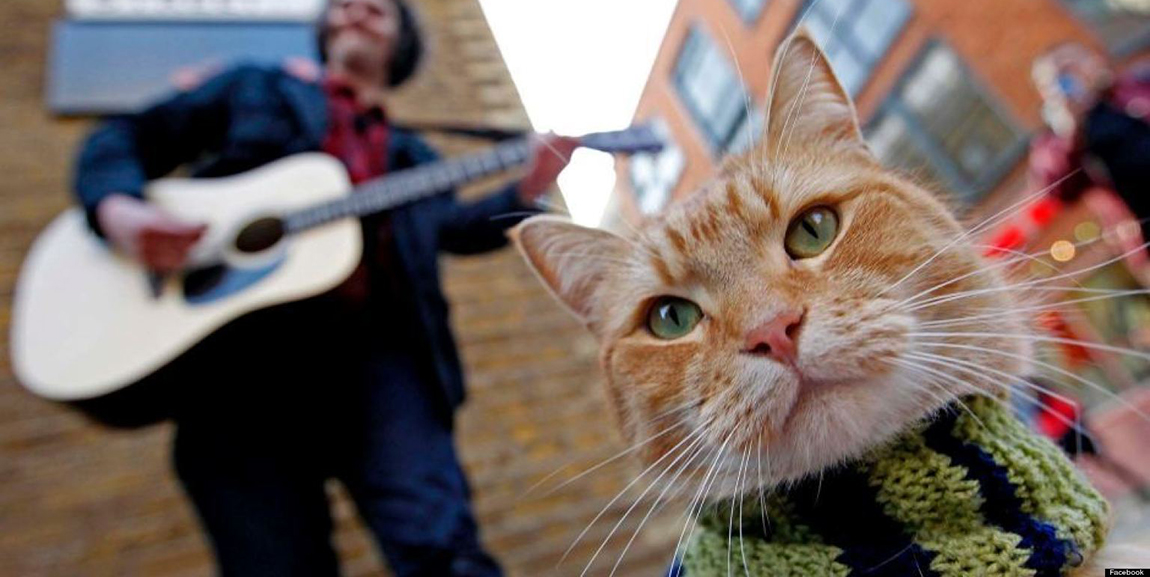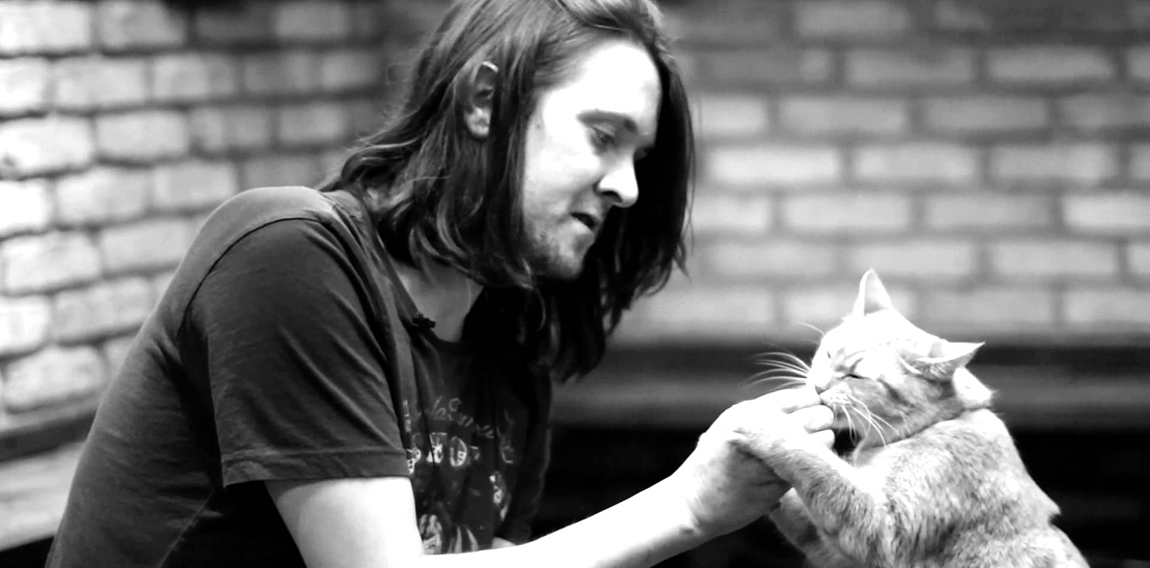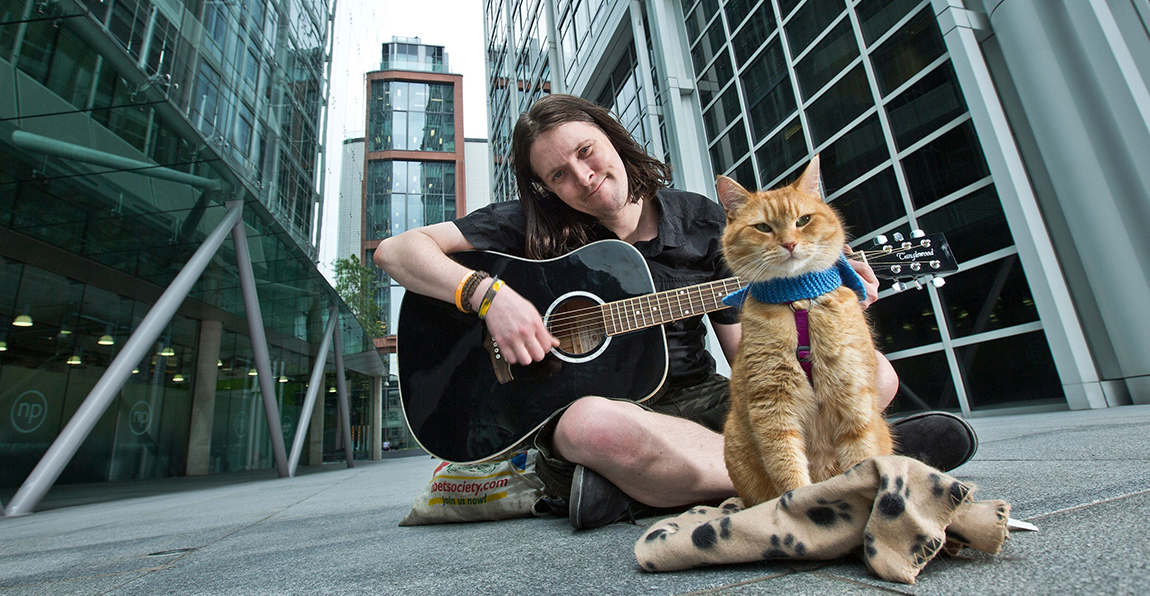English Discussion Club: "A Street Cat Named Bob"

James Bowen & Bob
Synopsis: Seen pragmatically, James Bowen's decision of adopting an injured cat was not very wise. The struggling London street musician was barely able to feed himself, much less another mouth, no matter how tiny. Nevertheless, he took in the stray, named him Bob, nursed him back to health, and then sent him on his way—or so he thought. But Bob had other ideas.
ex. 1 Watch the documentary about James Bowen and Bob. Study the vocabulary and answer the questions.
to turn something/somebody around – исправлять, изменять к лучшему
injured – раненый, поврежденный, травмированный
to busk – петь на улице
gorgeous - шикарный
celebrity - знаменитость
invisible - невидимый
perceived - кажущийся
coincidence - совпадение
a strange set of consequences – странная череда событий
Questions:
- How did he come to living on the street? What do you know about his life before James met Bob?
- How did he meet Bob?
- How did things change in James's life after he met Bob?
- Why does James call himself "selfish"? Did it change and what was the reason for it?
- What is the purpose of the book? Who and how can it help?
- What is James’s message to homeless people?

ex. 2 Read an excerpt from James Bowen’s book “A Street Cat Named Bob”. Study the vocabulary.
quirk – странность, причуда
to neuter a cat – кастрировать кота / стерилизовать
to amuse oneself - развлекаться
bumblebee – шмель
to struggle – испытывать трудности (тут: барахтаться)
gently – аккуратно, осторожно
impressive – впечатляющий
delicately - деликатно
to neuter a cat – кастрировать кота / стерилизовать
to amuse oneself - развлекаться
bumblebee – шмель
to struggle – испытывать трудности (тут: барахтаться)
gently – аккуратно, осторожно
impressive – впечатляющий
delicately - деликатно
Living with Bob was fun. There was never a dull moment. He was a real personality. He had all sorts of quirks to his character, and I was discovering more and more of them every day.
He was calmer after he’d been neutered. But he could still be a complete maniac around the flat and would frequently almost destroy it, playing with anything that he could lay his paws on. One day I watched him amuse himself for the best part of an hour with a bottle top. Another time he found a bumblebee. It was obviously injured – it had one wing damaged – so it was struggling around on the coffee table in the living room. The bee was rolling around and every now and again it would fall off the table on to the carpet. Every time this happened, Bob would very gently pick it up with his teeth and put it back on the table. It was really impressive the way he could delicately pick the bee up by the wing and place it safely on the flat surface. He’d then watch it while it struggled around again. It was a really comical sight. He didn’t want to eat it. He just wanted to play with it.
He was calmer after he’d been neutered. But he could still be a complete maniac around the flat and would frequently almost destroy it, playing with anything that he could lay his paws on. One day I watched him amuse himself for the best part of an hour with a bottle top. Another time he found a bumblebee. It was obviously injured – it had one wing damaged – so it was struggling around on the coffee table in the living room. The bee was rolling around and every now and again it would fall off the table on to the carpet. Every time this happened, Bob would very gently pick it up with his teeth and put it back on the table. It was really impressive the way he could delicately pick the bee up by the wing and place it safely on the flat surface. He’d then watch it while it struggled around again. It was a really comical sight. He didn’t want to eat it. He just wanted to play with it.
apparent - очевидный
to scoop - черпать
to guzzle – жадно глотать
to adapt to something – привыкать к чему-либо, адаптироваться
a square meal – сытная еда
to scoop - черпать
to guzzle – жадно глотать
to adapt to something – привыкать к чему-либо, адаптироваться
a square meal – сытная еда
The street instinct was still apparent when it came to food as well. Despite the fact I was feeding him on a regular basis, he still treated every meal as if it was going to be his last. At home in the flat, the moment I scooped some cat food into his bowl he would stick his face in it and start guzzling as if there was no tomorrow. “Slow down and enjoy your food, Bob,’ I’d tell him, but to no avail. Again, I figured he’d spent so long in the streets that he hadn’t adapted to living in a place where he was guaranteed a square meal twice a day. I knew how that felt. I’d spent large chunks of my life living the same way. I couldn’t really blame him. Bob and I had so much in common. Maybe that was why the bond had formed so fast - and was growing so deep.
to sit on somebody's lap – сидеть у кого-либо на коленях
to swat – прихлопнуть (например, муху)
paw - лапа
to ensconce – уютно устроиться
hilarious – очень смешной
telly (British slang) - телевизор
to be fascinated by something – быть завороженным чем-либо
to swat – прихлопнуть (например, муху)
paw - лапа
to ensconce – уютно устроиться
hilarious – очень смешной
telly (British slang) - телевизор
to be fascinated by something – быть завороженным чем-либо
The other funny habit he’d developed was watching television. I first noticed that he watched things on screens one day when I was playing around on a computer in the local library. He had decided to sit on my lap and was staring at the screen with me. I noticed that as I was moving the mouse around he was trying to swat the cursor with his paw. So back at the flat, as an experiment one day, I’d just put the TV on and left the room to go and do something in the bedroom. I came back to find Bob ensconced on the sofa, watching.
I’d heard about cats watching TV from a friend whose cat loved “Star Trek: The Next Generation”. Whenever it heard that familiar music - Dah-Dah Dah Dah Dah-Dah Dah Dah - he’d come running into the room and jump on the sofa. I saw it happen a few times and it was hilarious. No joke.
Pretty soon, Bob had become a bit of a telly addict as well. If something caught his eye, then he suddenly was glued to the screen. I found it really funny watching him watching Channel Four racing. He really liked the horses. It wasn’t something I watched but I got a real kick from watching him sitting there fascinated by it.
A. Find English equivalents in the text:
I’d heard about cats watching TV from a friend whose cat loved “Star Trek: The Next Generation”. Whenever it heard that familiar music - Dah-Dah Dah Dah Dah-Dah Dah Dah - he’d come running into the room and jump on the sofa. I saw it happen a few times and it was hilarious. No joke.
Pretty soon, Bob had become a bit of a telly addict as well. If something caught his eye, then he suddenly was glued to the screen. I found it really funny watching him watching Channel Four racing. He really liked the horses. It wasn’t something I watched but I got a real kick from watching him sitting there fascinated by it.
A. Find English equivalents in the text:
что касается, безрезультатно, уморительный, испытывать трудности, причуда, поднимать, прибрать к рукам (лапам), развлекаться, очевидный, регулярно, винить, замедляться, прикинуть, иметь что-то общее, приклеенный к чему-либо, привычка, зависимый, находить удовольствие в чем-то.
B. Make one sentence using Present Simple or Future Simple with when/if:
For example: his quirks get worse / she has to take action. - If his quirks get worse, she will have to take action.
- people struggle in life / their friends have to help them.
- you think you drive too fast / you slow down.
- you do sports on a regular basis / you gain weight.
- he picks it up / he drops trash on the floor.
- they figure something out / they have any problems.
- he destroys it / he lays his hands on something.
- you give him an iPad / he is glued to it.
C. Complete with prepositions where necessary:
- Don't even dream about it! You will never lay your hands ____ my possessions.
- She was a real couch potato when it came ____ leisure-time activities.
- John, I dropped my purse. Could you please pick it ____ for me?
- I didn't go with them to a football match, because it's not something I get a kick ____.
- I see this man ____ a regular basis. I think I already know everything ____ him.
- It became apparent ____ me that Bob was a stray.
- Mary struggled ____ her life: she barely had money to pay ____ her bills.
- James and Bob had a lot ____ common.
- They wanted to persuade her to give ____ but ____ no avail. She just went ____trying.
10. Telly addicts are glued ____ their TVs and do nothing else.
D. Use infinitives or gerunds
- He really enjoys _____ (to blame) others for things he has done.
- We try _____ (to do) exercise on a regular basis.
- Sometimes you need _____ (to find) something you get a kick out of.
- Bob spends a lot of time _____ (to amuse) himself.
- I would like _____ (to ask) him to stop, but I know it would be to no avail.
- When are you going to finish _____ (to tell) that joke? It is not as hilarious any more.
- He promised _____ (to pick) up things he had left on the floor.
- I don't think I should go on _____ (to watch) TV. I am becoming a real TV addict!
- He's got this habit of _____ (to leave) toothpaste open.
E. Complete with these expressions in an appropriate form:
spend time
waste time
in time
on time
it takes
not to have enough time
- How much time _______ it _______ you to get to the metro station?
- He never comes _______, always 5 minutes later.
- I don't sleep much because I _______.
- How do you _______ when you are alone in an unknown city?
- I promise I will be _______.
- There are different ways of _______: watching TV, surfing the Internet, playing video games etc.
F. Mark the sentences True or False:
- Bob wasn't different from any other stray cat.
- It was difficult to find something that would amuse him.
- Once he just watched a bumblebee as it struggled on the coffee table.
- Soon Bob got used to being James's pet and having regular meals.
- Bob and James had a lot in common.
- Bob enjoyed watching a computer screen as James worked.
- Bob's favorite film was "Star Trek: the Next Generation."
- James was annoyed by Bob's habit of watching horses on Channel Four.
G. Answer the questions:
-
What do you think would have happened if James hadn't met Bob?
-
Do you think the current popularity is good for them? What can they do with it?
-
Do you ever imagine what you would do if you were homeless?
-
What is your attitude towards homeless people? What about homeless animals?
-
Do you agree with people who think that we must help homeless animals, not homeless people?
-
What would you do if you saw a homeless or dirty-looking man lying unconscious on the street?
-
What would you do if you saw a dying dog or a cat on the street?
-
Do you think you could let a homeless animal in?
-
What does this friendship with Bob mean for James?
